
In healthy relationships, both partners support each other’s dreams and passions! Show interest in your partner’s dreams and ask them how you can best support them in achieving their goals!

In healthy relationships, both partners support each other’s dreams and passions! Show interest in your partner’s dreams and ask them how you can best support them in achieving their goals!
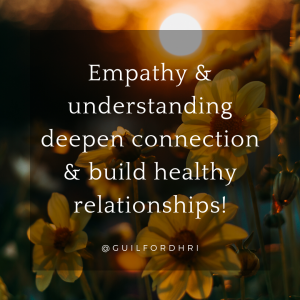
Strive for empathy and understanding in your relationships!
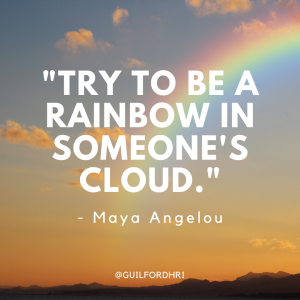
Strive to bring joy into the lives of those you love! When we promote love and joy, we can spread hope throughout our families and communities.
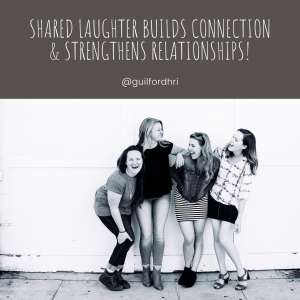
Laughter and fun are key components of a healthy relationship! Shared laughter deepens connection and strengthens your relationships. It allows for moments of joy, lightheartedness, and love!
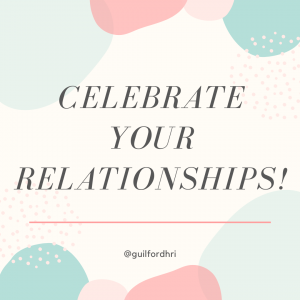
Savor the many wonderful moments throughout your relationships! When you celebrate your relationships, you can find joy and excitement, while deepening your bond with your loved ones.
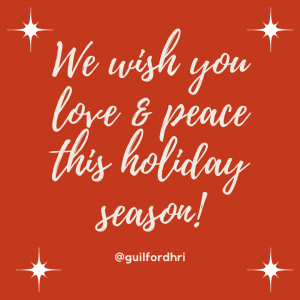
Happy Holidays from HRI! We wish you love and peace this holiday season!

Though spending time with our family during the holidays can create special and lasting memories, it can also be draining, especially with the many things we often have to juggle. We encourage you to take a break from entertaining, decorating, preparing, and connecting with others to take some time for yourself. Giving yourself the gift of self-care will allow you to feel re-energized and ready to take on the holiday season!
When you practice self-care, you can be the best version of yourself for your loved ones. You will feel calmer and more grounded, giving yourself a solid foundation to maintain a positive attitude, manage any difficult emotions, and navigate potentially tricky relationships with family members.
We hope the tips we have shared over the past several days will help you develop healthier relationships this holiday season!

Holiday stress and difficult family dynamics can make it hard for us to practice gratitude and give one another grace. It can be easy to get wrapped up in chaos and conflict and lose sight of joy and love during the holidays. This holiday season, we encourage you to practice daily gratitude. Whether you take mental note of the moments of gratitude you notice or find it more effective to keep a gratitude journal, being intentional about seeking out little things that bring you joy throughout your day can help you feel happier and more at peace during the holidays.
An important part of navigating challenging family dynamics is trying your best to give yourself and others grace. No one is perfect, and we’re all just trying our best. If you’re feeling upset or frustrated with a family member, keep in mind that we are all human and make mistakes. By adopting a mindset of grace and trying to see things from others’ perspectives, you may find understanding and feel more at peace.

Spending the holidays with family allows us to connect with people we may not get to see often and build deeper relationships with loved ones. However, it also means navigating difficult conversations and tricky relationships. We may have family members who we don’t always get along with or who have different beliefs and points of view than us, which can be challenging to handle. We may also be subject to personal questions that we don’t feel comfortable talking about.
If you find yourself encountering a difficult situation with a family member, remember that you have the right to communicate clear boundaries that allow you to feel safe and comfortable. Before the holiday festivities go into full swing, reflect on your needs and boundaries related to navigating family dynamics this holiday season. By considering your boundaries ahead of the holidays, you can feel more prepared to set healthy boundaries and handle difficult family dynamics. Healthy boundaries not only include what you do or do not feel comfortable discussing with family members, but they also look like allowing yourself space when you’re feeling overwhelmed or overly stressed. Healthy boundaries for you this holiday season may mean saying no to a holiday party or family gathering to give yourself time to recharge. For more information on how to set healthy boundaries visit our “How do I set healthy boundaries in my relationships?” blog post.

Complicated family dynamics during the holidays can often bring up strong emotions, which can be difficult to cope with when experiencing the added stress and pressure that often accompanies the holidays. If you find yourself having a strong emotional reaction when you are with your family, remind yourself that your feelings are valid. You are allowed to feel upset or angry. However, keep in mind that reacting or responding when we are very upset or emotionally dysregulated can often lead to escalation and spark arguments.
If you notice that you are feeling emotionally dysregulated, we encourage you to acknowledge your feelings and take steps to calm down before responding or reacting to a family member. A great way to cope with a strong emotional reaction or feelings of stress and anxiety brought on by the holidays is to practice mindfulness. This may look like taking some deep, calming breaths, repeating a calming mantra, excusing yourself from a situation, counting to ten, or a variety of other calming techniques. By using mindfulness strategies to calm down and regulate your emotions, you will be able to respond to stressful, upsetting, or anxiety-provoking situations in a kinder, more effective manner. Instead of reacting and potentially escalating a situation, you will be able to control your response and know that you did your best to handle a challenging family situation respectfully and graciously.